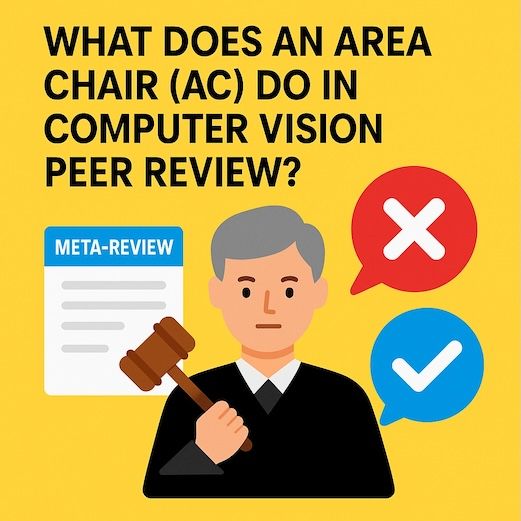What Does an AC (Area Chair) Actually Do in CV/AI Conferences?
-
Many researchers misunderstand how the review process works in top-tier computer vision conferences. This confusion often causes frustration for both authors and reviewers. Here’s a summary from the perspective of an Area Chair (AC), to clarify common misconceptions and shed light on what the AC’s role really entails.

What Does an AC Actually Do?
If you’ve submitted to conferences like CVPR or SIGGRAPH, you might have encountered an AC through:
- The meta-review you receive,
- Or during rebuttal and discussion stages.
But the real job of an AC goes far beyond writing a short summary.
The AC is like a judge:
- They coordinate the entire review process.
- They recruit emergency reviewers if needed.
- They facilitate discussions among reviewers.
- They ensure that decisions are well-founded, fair, and aligned with the reviewers’ assessments.
In short, ACs are responsible for the overall quality control of the review process.
 Common Misconceptions
Common Misconceptions1. My paper’s fate is decided by average review scores.
 Not true.
Not true.ACs don’t just average the review scores. Instead, they:
- Analyze each review’s reasoning, both positive and negative.
- Pay close attention to the rationale behind the scores.
 ️ A well-argued low or borderline review might carry more weight than a shallow high score.
️ A well-argued low or borderline review might carry more weight than a shallow high score.
2. ACs have total authority to accept or reject a paper.
 Also not true.
Also not true.In vision conferences, ACs are not omnipotent decision-makers.
They are more like judges in a debate:
- Listening to both reviewers (the "prosecution") and authors (the "defense").
- Making a reasoned recommendation based on the evidence.
 ️ The final decision often involves multiple ACs (triplet discussion) and may escalate to senior ACs (SAC) or PC chairs for tough cases.
️ The final decision often involves multiple ACs (triplet discussion) and may escalate to senior ACs (SAC) or PC chairs for tough cases.So: ACs coordinate and recommend, but don’t decide alone.
 On Rebuttals and Fairness
On Rebuttals and Fairness- ACs do not see the authors’ identities, maintaining the double-blind review process.
- “Backdoor acceptance” via connections or identity is not possible.
- Good ACs pay attention to authors’ rebuttals, especially when pointing out reviewer misunderstandings.
 TL;DR: What You Should Know as an Author
TL;DR: What You Should Know as an Author- Don’t just focus on review scores. Make sure your rebuttal addresses core concerns logically and clearly.
- ACs do read your response carefully, especially if you clarify key misunderstandings.
- No paper is “doomed” by a single review, but weak rebuttals can hurt your chances.
- ACs strive for fairness, but they also depend on the quality of the reviewer comments and your reply.
 Insight: “AC decisions are more like a courtroom than a dictatorship.”
Insight: “AC decisions are more like a courtroom than a dictatorship.”
 This post is *based on insights shared by Tiankai Xue (CVPR/SIGGRAPH AC)
This post is *based on insights shared by Tiankai Xue (CVPR/SIGGRAPH AC)
